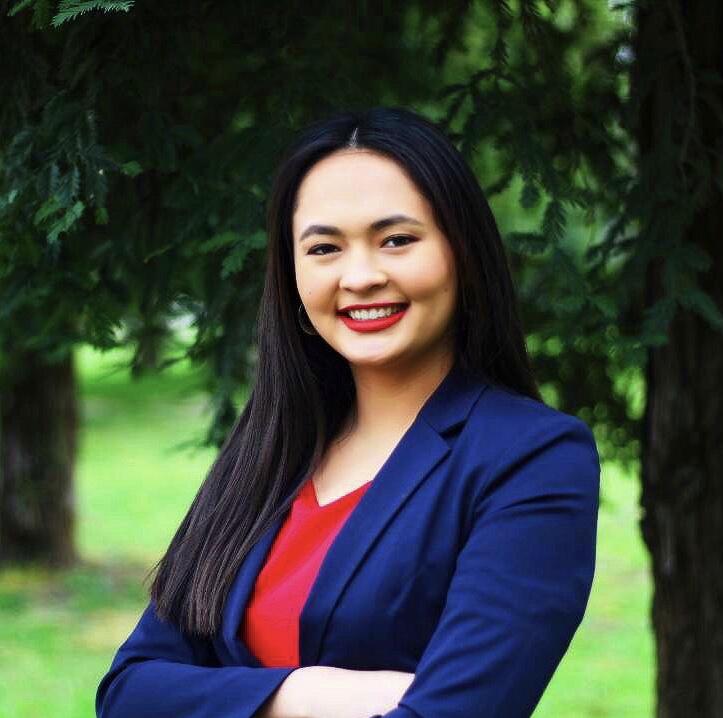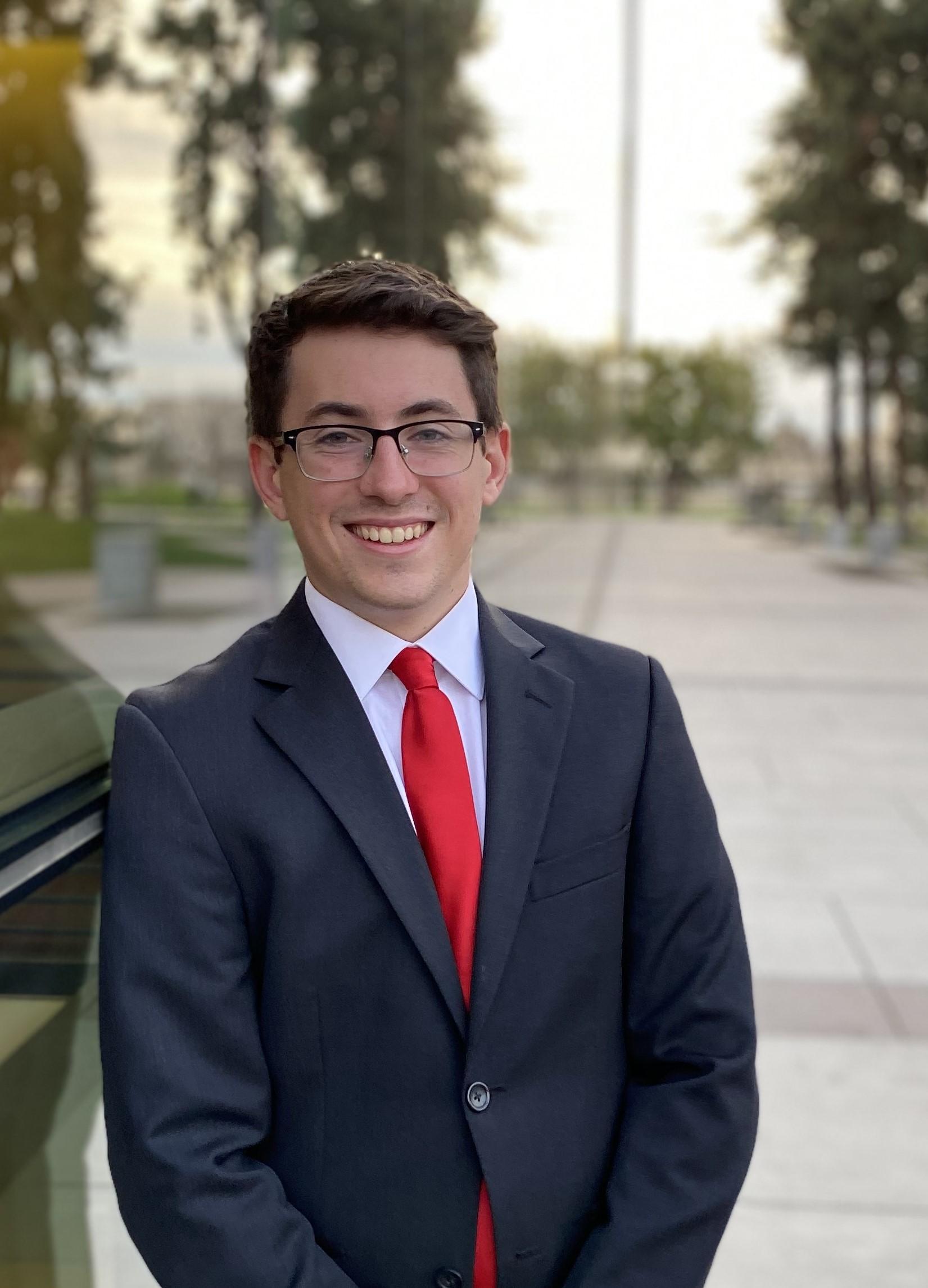Four Associated Students Inc. (ASI) presidential candidates debated on presidential goals and campus repopulation at the ASI presidential debate on Monday.
The 2021 ASI presidential debate was held virtually and livestreamed on Facebook Live for the Fresno State community.
Presidential candidates Isabella O’Keeffe, Nicholas Moore, Steven Hensley and D’Aungillique Jackson were given one minute each to answer questions posed by Collegian reporter Edward Lopez, the moderator of the debate.
Candidates were first asked about what they seeked to accomplish within their tenure as ASI president, if elected.

O’Keeffe answered by emphasizing transparency and providing students a voice on campus, noting the importance of student voices in campus issues and the need to collaborate with administration to provide students assistance in transitioning to in-person classes or continuing online courses.
“I think it’s vital that we have a bigger say in deciding factors… that will ultimately affect our future,” O’Keeffe said. “In addition to that, our courses are virtual. Some people are in-person and some people aren’t. Some people are not able to come in person due to health concerns and I think that’s important to acknowledge.”
Moore said he will ensure that campus clubs receive support especially with the anticipation of the return to campus in the 2021-22 academic year, and that he will work towards encouraging students to join campus-wide committees.
“The thing I want to ensure is that more students are on campus wide committees,” Moore said. “There are a lot of campus-wide committees that only have one or two student voices on them, and I would love to get more, to get the students, to make sure that faculty hears what students have to say.”

Hensley responded with an emphasis on creating a safe community for students to express their concerns and to receive support at the Fresno State campus. He added that he will work toward negotiating a format that will allow students to return to in-person learning if they are capable and to provide students who prefer virtual learning the opportunity to remain online.
“I would like to help establish an environment, on campus and off of campus, that is more inclusive, that has this sense of vulnerability where people feel that they can be themselves. Where students feel that they don’t have to hide what they’re going through. Where they don’t have to hide what they’re feeling,” Hensley said.
Jackson answered by highlighting her goal to prioritize the inclusion of students within campus and to prioritize the mental health of the Fresno State community. She also detailed her goal to work on town halls for the university’s colleges to provide students a platform to discuss issues within their respective colleges.

“[The inclusion of students] includes our LGBTQIA+ populations, those with disabilities, those of different, varying racial and ethnic backgrounds. It’s important to make sure that, that they’re supported that they have that, that access,” Jackson said. “Another thing that I want to work on is town halls for each of the colleges … it’s going to make students feel more seen, more aware, and actually given a space to really find the issues that they’re dealing with in their respective areas.”
Candidates were then asked about their plans to assist students in the safe repopulation of campus for the fall 2021 semester.
O’Keeffe responded by noting that returning to campus will be a “wants versus needs situation.” She said prioritizing the safety of students as well as accommodating those who do not have access to the COVID-19 vaccine must be considered in the planning process.
“A lot of us want to go back to campus but the necessity is definitely our health. We need to focus on our health and safety and wellbeing of others,” O’Keeffe said. “In order to do that, we need to follow federal and state guidelines … we don’t just have students that live in Fresno. We have students that live all over the country… people living in different states and different areas may not have access to the vaccine.”

Moore said he aims for Fresno State to turn towards hybrid learning to accommodate students who wish to return to campus and those who prefer virtual learning.
“There are a lot of students who want to be on campus but there are also a lot who wants to continue with the virtual, and I think making sure students have the options and that faculty gives students the options to choose … is the most important thing for transitioning back into the, into physical learning,” Moore said.
Hensley responded by saying that the process returning to campus will be gradual. He noted that offering hybrid classes for students who have found online classes beneficial will allow students a smooth transition back to campus.
“We can’t just throw everybody back into a room and have everyone there together at full capacity. But what is beneficial is, as Nicholas suggests, is that sense of hybrid learning, which benefits a lot of students… So really emphasizing the online and in-person for those who find it to be preferable, I think, is one of the best strategies,” Hensley said.
Jackson answered by emphasizing the need to practice leniency alongside ensuring Fresno State students and the community have access to COVID-19 vaccines and tests. She said that supporting campus resources are key components to a smooth transition back to campus.
“I really want to reiterate that we need to really practice leniency during this pandemic because we’re all, we’re all struggling in some way shape or form… we’re going to see a lot of people coming out of isolation and [returning] to regular day-to-day life. That’s going to be very stressful, so it’s important for us to make sure that we can support our students in the mental health realm and our faculty and staff members,” Jackson said.
In their closing statements, candidates highlighted the focus of their campaigns.
O’Keeffe summarized her campaign into three focuses: advocacy, resilience and compassion.
“Even though we all look to the future, I want to acknowledge the past opportunities lost and missed and still recognize the importance, and hopefully, although it won’t be the same timeline, give you an alternative for commencement opportunities and sports, and all of that. I think everything everyone does is an achievement and should be celebrated. Going to college is an achievement. Going to college during a pandemic… is an accomplishment,” she said.
Moore said that he will apply his previous experiences in ASI to provide for the campus community.
“I just want to say that, as someone who has a lot of experience in ASI, if elected, I will effectively be able to utilize the tools that ASI has access to, to advocate for the student body and try and improve the lives of students however I can,” he said.
Hensley said that, if elected, he will remain at the same level as all students and staff at Fresno State and expressed gratitude to his fellow candidates for their efforts to promote the needs of students.
“I want to emphasize once again that it’s not going to put me in a position above anyone else, but instead I will be right here at the same level as everyone, promoting the needs and the desires and the things that our Fresno State students and staff need, basically, to facilitate the wonderful institution that is Fresno State… we’re here to promote the needs of Fresno State students,” Hensley said.
Jackson emphasized her campaign’s focus of inclusion, and said she will prioritize focus in areas of mental and physical health of the Fresno State community.
“I guess you could even say my slogan for this campaign is inclusion, and just inclusion. When we’re talking about intersectionality, the most important part of that is inclusion. So that’s what I want to focus on in all avenues and mental health and physical health and how our campus looks and learning environments and so much more… as well as just making sure, overall, that ASI itself is able to continue to do all of the amazing things that they have been able to accomplish,” Jackson said.
The 2021-2022 ASI election will begin on Tuesday, April 6 at 9:00 a.m. and will end on Thursday, April 8 at 12:00 p.m. ASI election results will be finalized on April 29.




